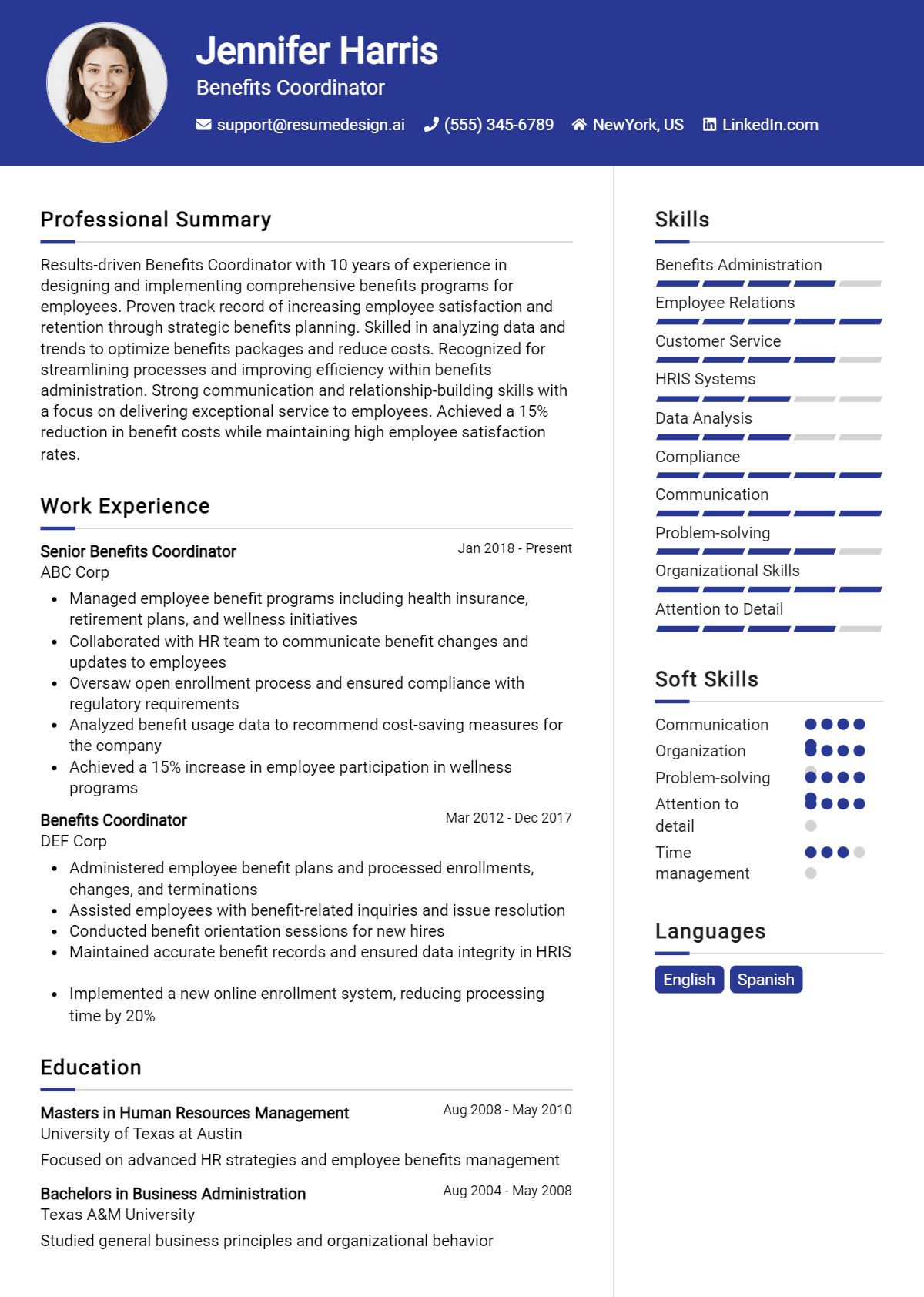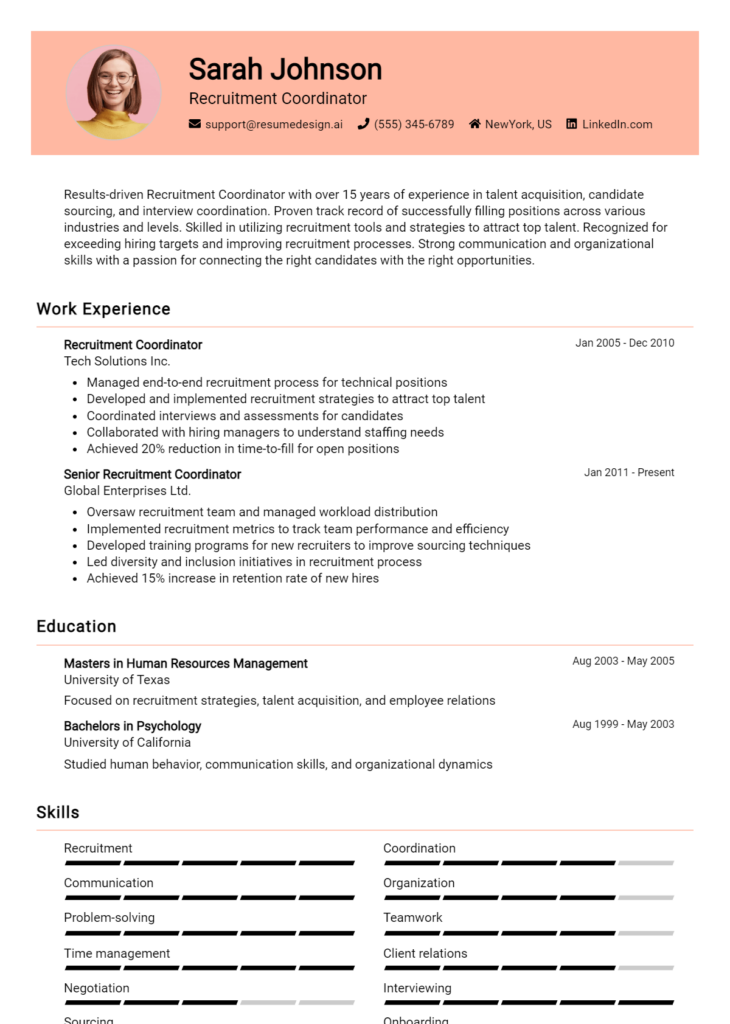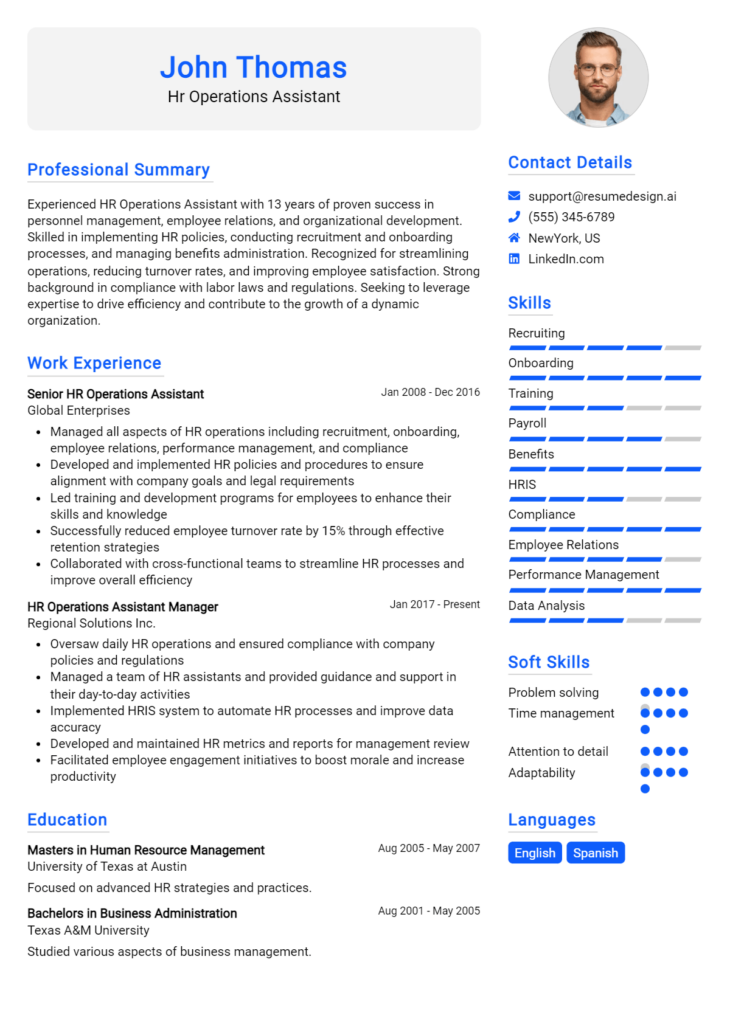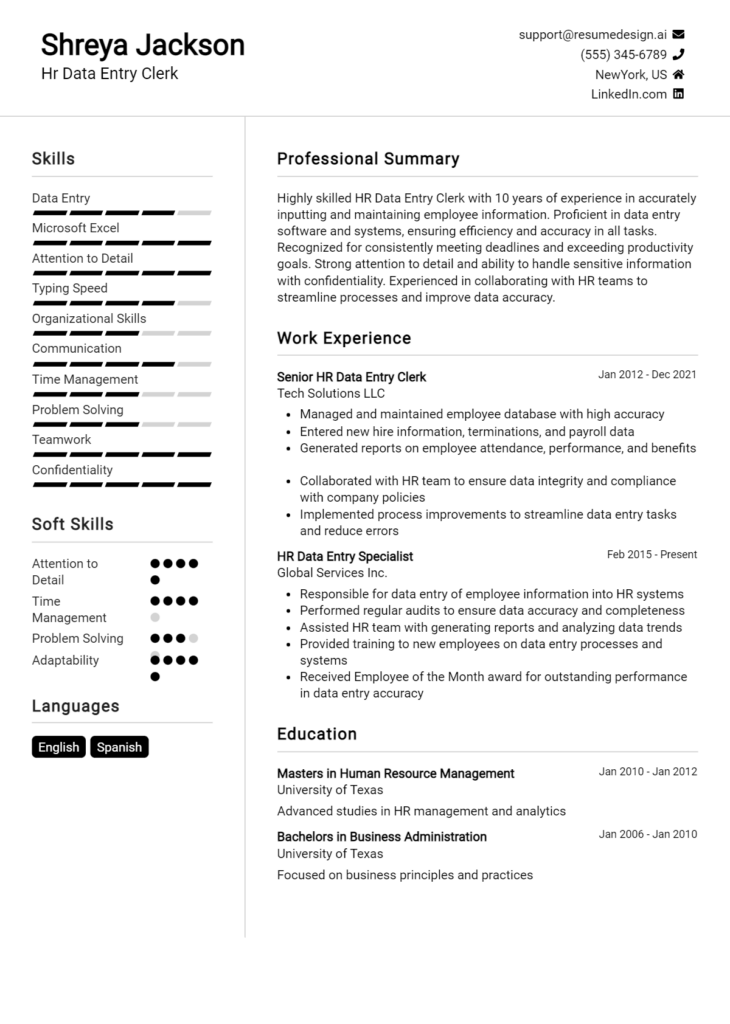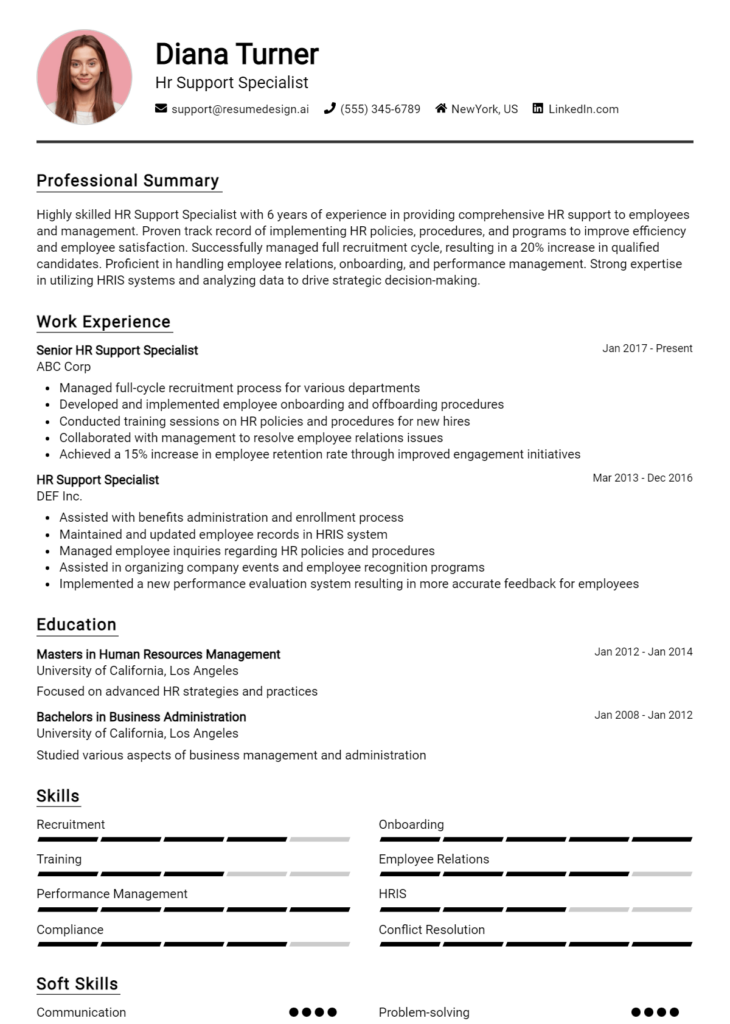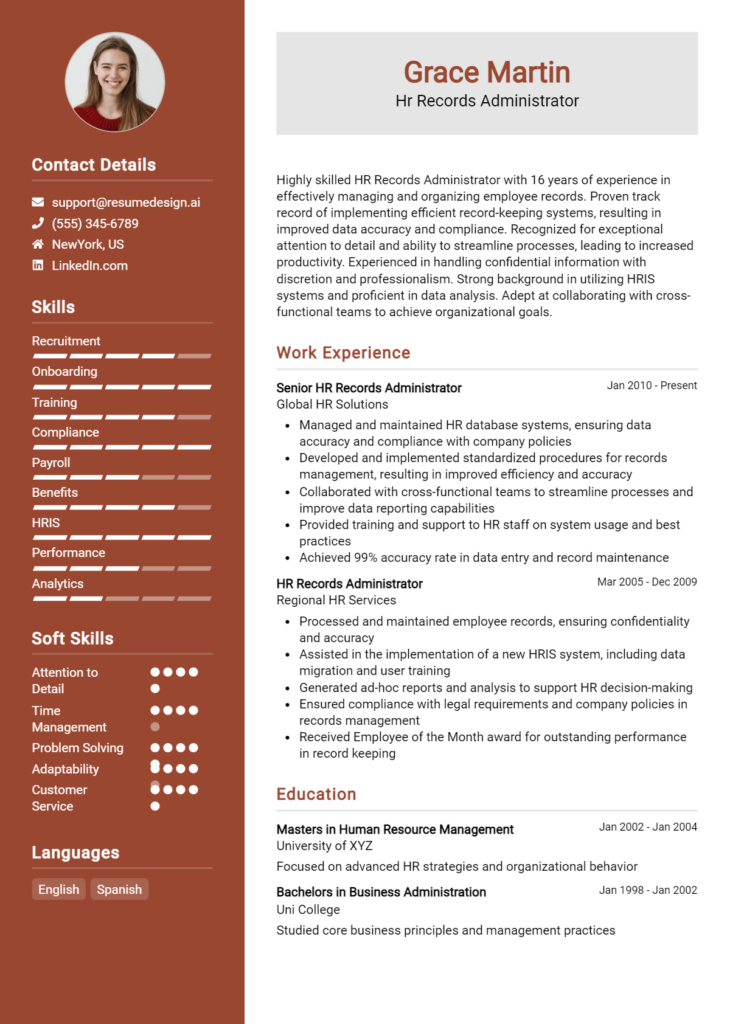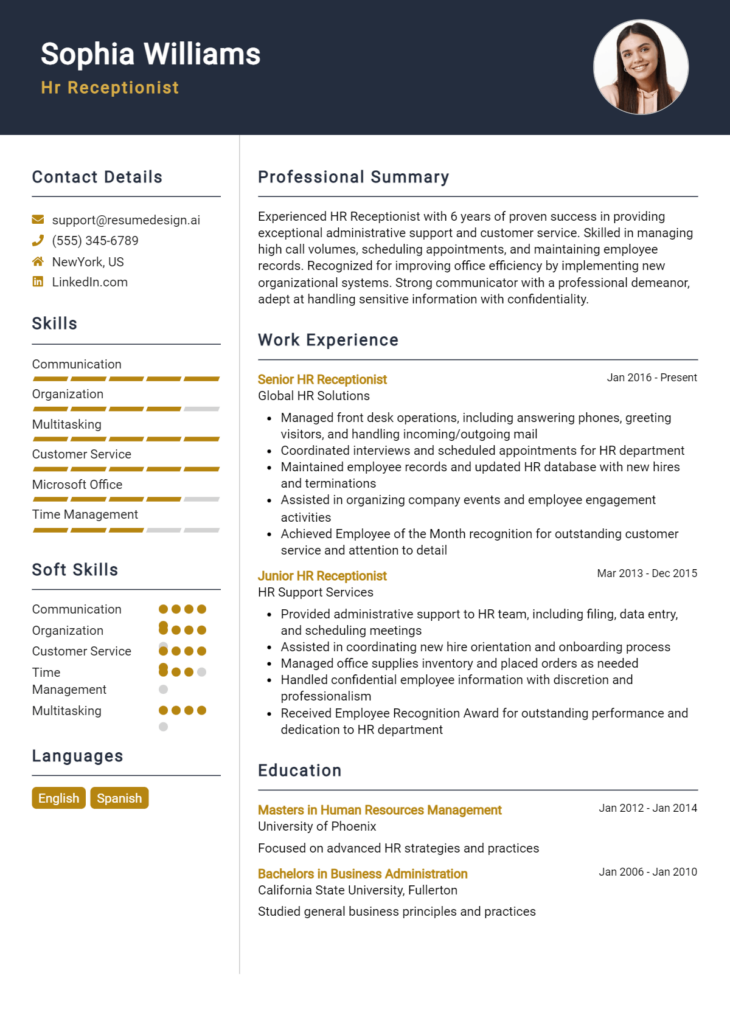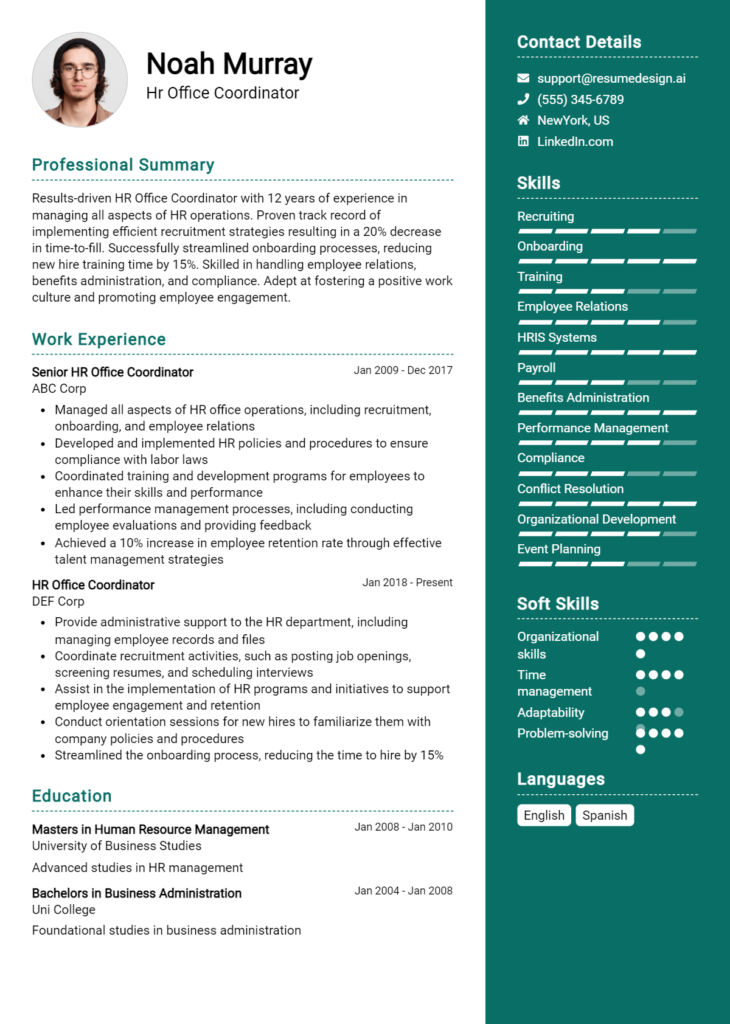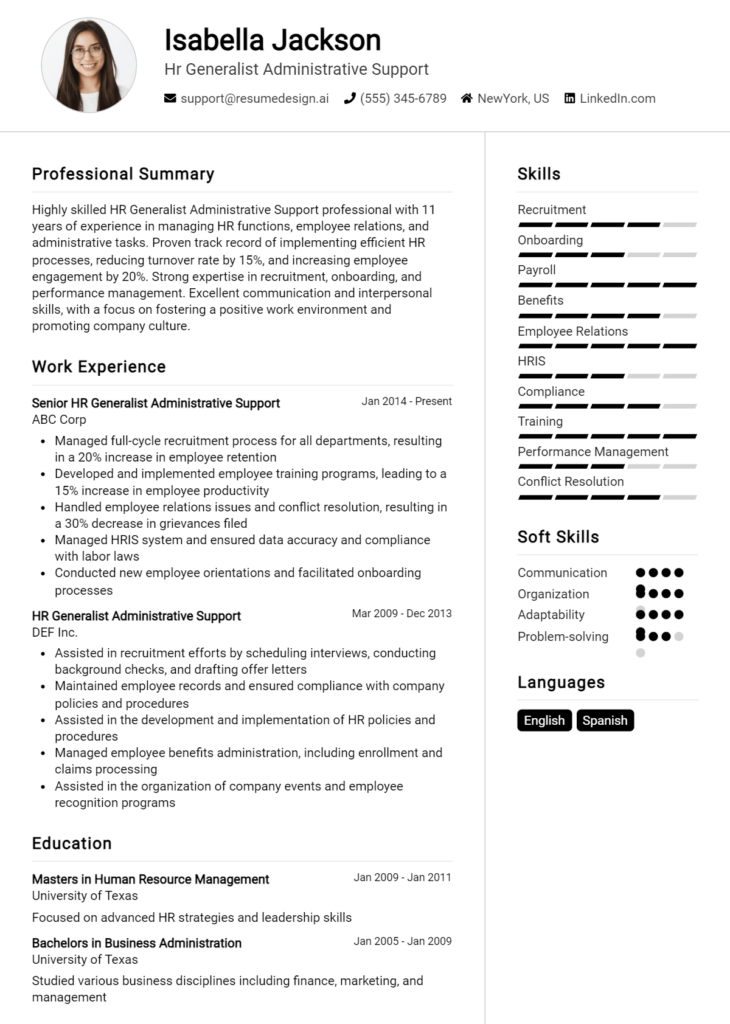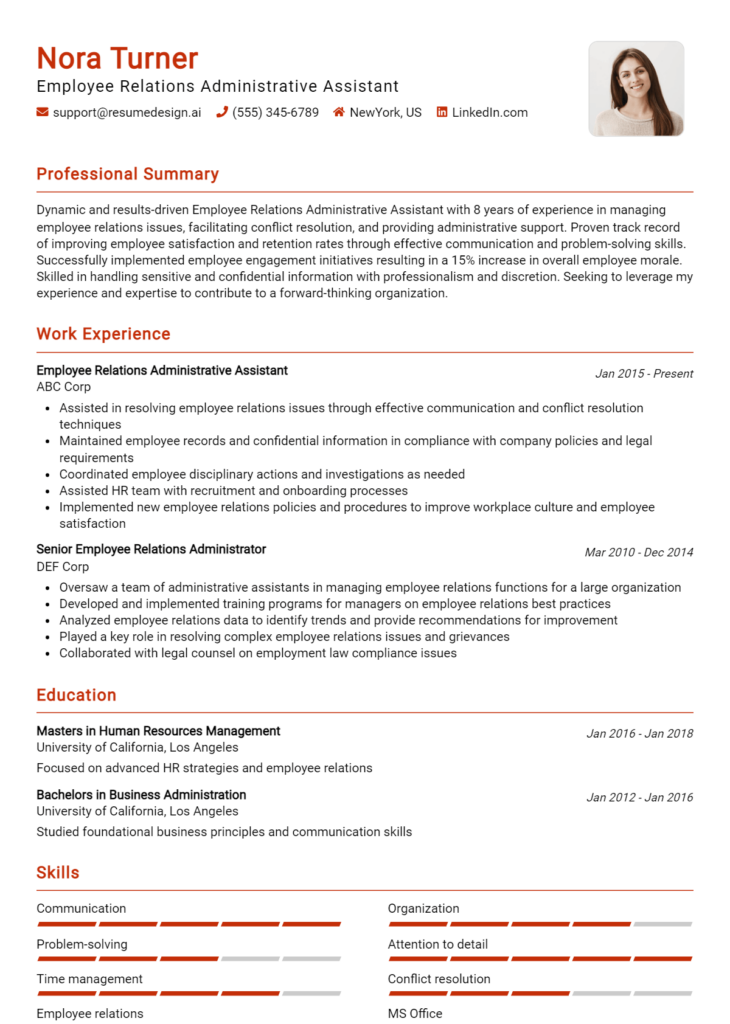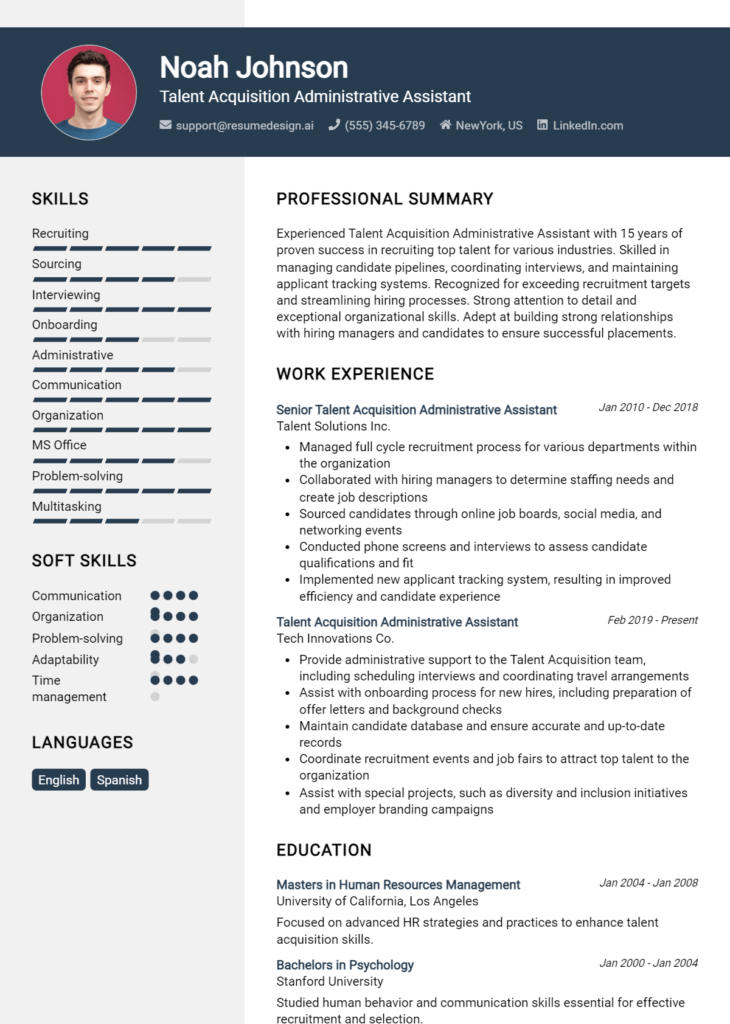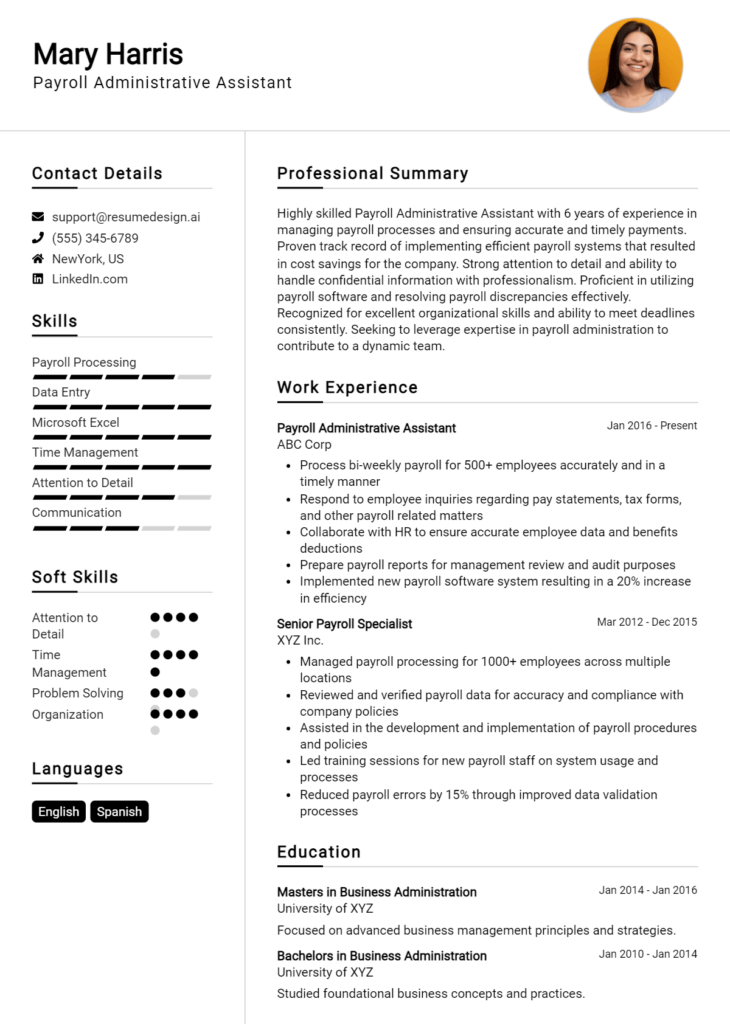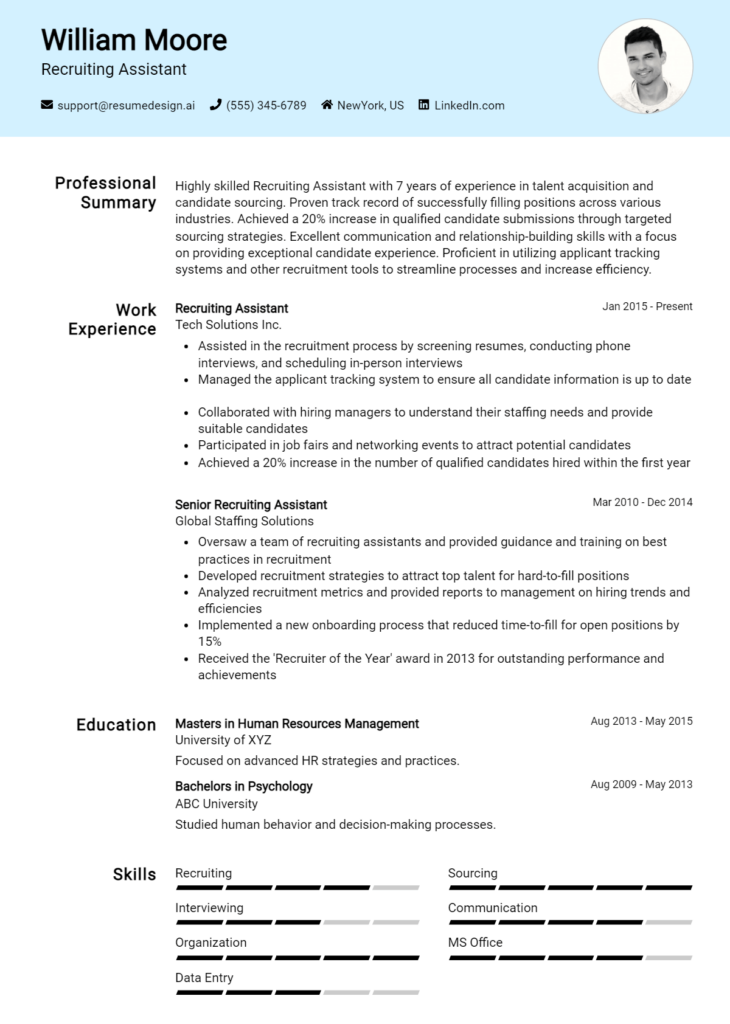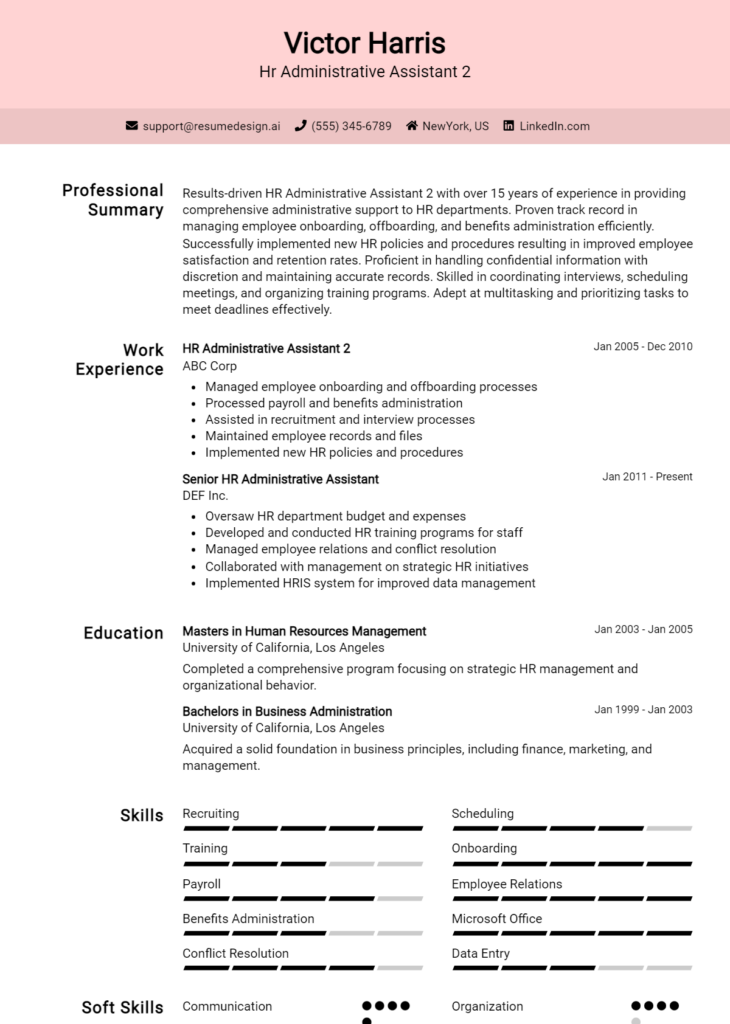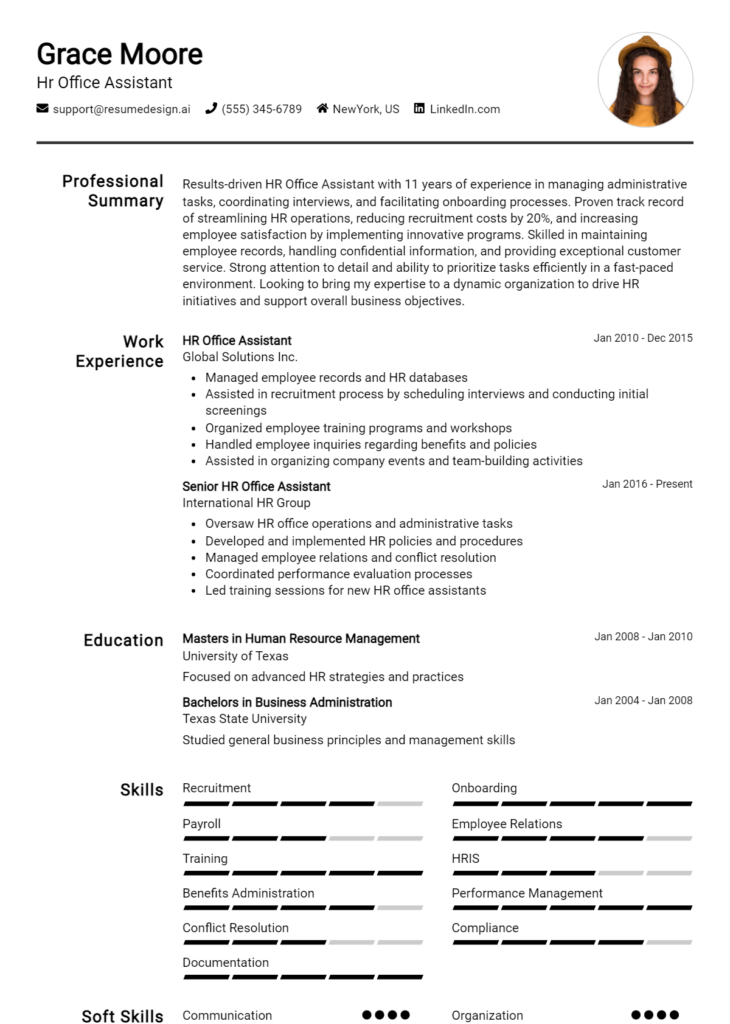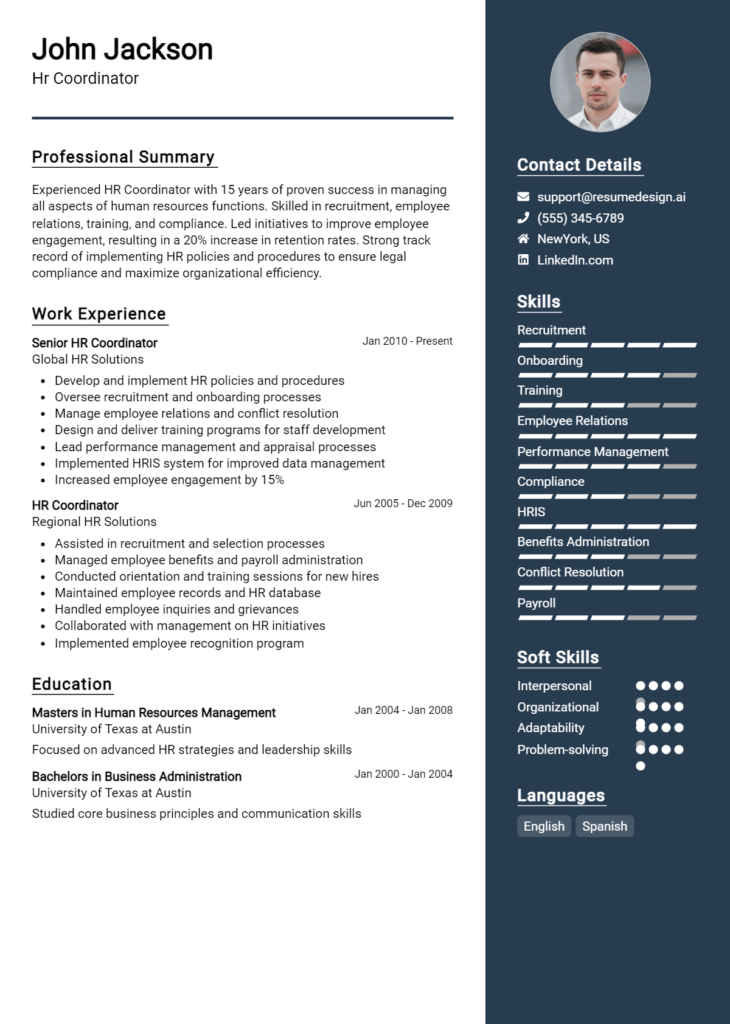Benefits Coordinator Core Responsibilities
A Benefits Coordinator plays a crucial role in managing employee benefits programs, requiring strong technical, operational, and problem-solving skills. This position bridges HR, finance, and legal departments, ensuring compliance and effective communication. Responsibilities include analyzing benefits data, facilitating enrollment processes, and addressing employee inquiries. These skills are vital for aligning benefits strategies with organizational goals. A well-structured resume can effectively showcase these qualifications, highlighting the candidate’s ability to enhance employee satisfaction and retention.
Common Responsibilities Listed on Benefits Coordinator Resume
- Administer employee benefits programs and policies.
- Conduct benefits orientation for new hires.
- Assist employees with benefits enrollment and inquiries.
- Analyze and report on benefits utilization and trends.
- Ensure compliance with federal and state regulations.
- Collaborate with insurance providers and vendors.
- Maintain accurate records of employee benefits.
- Develop communication materials related to benefits.
- Evaluate and recommend benefits plan changes.
- Assist in budgeting and forecasting for benefits costs.
- Participate in benefits-related training and workshops.
- Address and resolve benefits-related issues and disputes.
High-Level Resume Tips for Benefits Coordinator Professionals
In the competitive field of human resources, a well-crafted resume is essential for Benefits Coordinator professionals looking to make a lasting impression on potential employers. Your resume is often the first glimpse a hiring manager has of your skills, experience, and achievements, making it crucial to present yourself effectively. A strong resume not only highlights your qualifications but also reflects your understanding of the benefits landscape and your ability to contribute positively to an organization’s workforce strategy. This guide will provide practical and actionable resume tips specifically tailored for Benefits Coordinator professionals, helping you to stand out in the applicant pool.
Top Resume Tips for Benefits Coordinator Professionals
- Tailor your resume to each job description by incorporating keywords and phrases that align with the specific role.
- Showcase relevant experience by detailing your past roles in benefits administration, employee relations, or HR management.
- Quantify your achievements with metrics, such as the percentage of benefits enrollment increases or the number of employees supported.
- Highlight industry-specific skills, including knowledge of benefits regulations, compliance, and employee assistance programs.
- Use clear and concise language to describe your responsibilities and successes in previous positions.
- Incorporate certifications, such as Certified Benefits Professional (CBP) or Professional in Human Resources (PHR), to demonstrate your commitment to the field.
- Include a summary statement at the beginning of your resume that encapsulates your unique qualifications and career objectives.
- Utilize a clean and professional format, making it easy for hiring managers to skim through your qualifications quickly.
- Focus on your soft skills, such as communication, negotiation, and problem-solving abilities, which are crucial for a Benefits Coordinator role.
Implementing these tips can significantly increase your chances of landing a job in the Benefits Coordinator field. By presenting a polished and targeted resume, you not only demonstrate your qualifications but also your understanding of the role's demands and your commitment to contributing to an organization's success. Remember, your resume is your personal marketing tool—make it count!
Why Resume Headlines & Titles are Important for Benefits Coordinator
The role of a Benefits Coordinator is crucial in any organization, as they manage employee benefits programs and ensure that employees are well-informed about their options. In today's competitive job market, having a compelling resume headline or title is essential for standing out among other candidates. A strong headline can immediately capture the attention of hiring managers, summarizing a candidate's key qualifications in a single, impactful phrase. It should be concise, relevant, and directly related to the specific job being applied for, effectively setting the tone for the rest of the resume.
Best Practices for Crafting Resume Headlines for Benefits Coordinator
- Keep it concise: Aim for one clear and impactful sentence.
- Be role-specific: Tailor the headline to reflect the Benefits Coordinator position.
- Highlight key qualifications: Focus on your most relevant skills and experiences.
- Use action-oriented language: Employ strong verbs to convey your contributions.
- Incorporate industry keywords: Use terminology that resonates with the HR and benefits field.
- Avoid clichés: Steer clear of generic phrases that don’t add value.
- Reflect your value proposition: Clearly state what you bring to the organization.
- Make it visually distinct: Use formatting such as bold or italics to make it stand out.
Example Resume Headlines for Benefits Coordinator
Strong Resume Headlines
Dedicated Benefits Coordinator with 5+ Years of Experience in Employee Benefits Management
Results-Driven Benefits Specialist Skilled in Implementing Comprehensive Benefits Solutions
Certified Benefits Coordinator Committed to Enhancing Employee Satisfaction and Retention
Weak Resume Headlines
Hardworking Employee
Benefits Coordinator Seeking Opportunities
Strong resume headlines are effective because they are specific, highlight relevant skills, and convey the candidate's unique value proposition clearly. They create an immediate connection with the hiring manager and set the stage for the rest of the resume. In contrast, weak headlines fail to impress due to their vagueness and lack of specificity, making it difficult for hiring managers to gauge the candidate's qualifications and potential contributions to the organization.
Writing an Exceptional Benefits Coordinator Resume Summary
A well-crafted resume summary is crucial for a Benefits Coordinator, as it serves as the first impression a hiring manager will have of a candidate. A strong summary quickly captures attention by highlighting key skills, relevant experience, and significant accomplishments that align with the job requirements. It should be concise yet impactful, tailored specifically to the job the candidate is applying for, which enhances the likelihood of making it past initial screenings and into the interview process.
Best Practices for Writing a Benefits Coordinator Resume Summary
- Quantify Achievements: Use numbers and percentages to demonstrate the impact of your work.
- Focus on Relevant Skills: Emphasize skills that are directly related to benefits coordination, such as compliance, communication, and analytical abilities.
- Tailor for the Job Description: Customize your summary to reflect the specific requirements and keywords found in the job posting.
- Be Concise: Aim for 3-5 sentences that effectively convey your qualifications without being overly verbose.
- Highlight Industry Knowledge: Mention your familiarity with benefits administration software, regulations, or industry best practices.
- Showcase Soft Skills: Include important soft skills like problem-solving, customer service, and teamwork that are essential for a Benefits Coordinator.
- Use Action Verbs: Start sentences with strong action verbs to create a dynamic and engaging summary.
- Demonstrate Continuous Improvement: Mention any initiatives you've led or participated in that improved benefits processes or employee satisfaction.
Example Benefits Coordinator Resume Summaries
Strong Resume Summaries
Results-driven Benefits Coordinator with over 5 years of experience in managing employee benefits programs, reducing administrative errors by 30% through streamlined processes. Skilled in compliance management and employee relations, leading to a 15% increase in employee satisfaction scores.
Detail-oriented Benefits Coordinator with a proven track record of administering complex benefits packages for over 1,000 employees. Successfully implemented a new benefits management software that decreased processing times by 40%, enhancing overall efficiency.
Dynamic Benefits Coordinator with expertise in regulatory compliance and benefits strategy development. Spearheaded an initiative that saved the company 20% in annual benefits costs while improving employee engagement through tailored benefits communication.
Weak Resume Summaries
Experienced professional seeking a position in benefits coordination. I have worked in human resources and have some knowledge of benefits.
Benefits Coordinator with experience in various roles. I am looking to help companies with their benefits needs.
The strong resume summaries are considered effective because they include quantifiable accomplishments, specific skills, and demonstrate direct relevance to the Benefits Coordinator role. They provide tangible evidence of the candidate's impact and capabilities. In contrast, the weak summaries lack detail, are vague, and fail to showcase any measurable outcomes or unique qualifications, making them less compelling to hiring managers.
Work Experience Section for Benefits Coordinator Resume
The work experience section of a Benefits Coordinator resume is crucial as it provides a comprehensive view of the candidate's professional background, technical skills, and ability to manage teams effectively. This section serves as a platform to showcase how past roles have prepared the candidate to deliver high-quality benefits administration and support. By emphasizing quantifiable achievements and aligning experience with industry standards, candidates can demonstrate their value to potential employers, making it essential to craft this section thoughtfully.
Best Practices for Benefits Coordinator Work Experience
- Highlight relevant technical skills, such as proficiency in HRIS software and benefits administration tools.
- Quantify achievements with metrics, such as the percentage of cost savings or improvements in employee satisfaction ratings.
- Showcase experience in managing teams, including leading projects and collaborating with cross-functional departments.
- Use action verbs to describe responsibilities and accomplishments, making statements more impactful.
- Align work experience with industry standards and job descriptions to demonstrate suitability for the role.
- Include specific examples of successful initiatives or programs developed to enhance employee benefits.
- Focus on continuous improvement efforts, such as process enhancements or technology implementations.
- Tailor the experience section to reflect the unique needs of the employer and the specific benefits offered.
Example Work Experiences for Benefits Coordinator
Strong Experiences
- Successfully implemented a new HRIS system that improved benefits enrollment efficiency by 30%, resulting in a 15% increase in employee satisfaction scores.
- Led a cross-functional team to launch an employee wellness program that decreased healthcare costs by 20% within the first year.
- Managed a benefits communication strategy that increased employee engagement by 40%, as measured by participation in open enrollment sessions.
- Developed and maintained relationships with benefits vendors, negotiating contracts that saved the organization $100,000 annually.
Weak Experiences
- Responsible for managing employee benefits.
- Assisted in processing benefits paperwork.
- Worked with vendors on benefits issues.
- Helped with benefits-related tasks as needed.
The examples provided illustrate the qualities that distinguish strong experiences from weak ones. Strong experiences are characterized by their specificity and quantifiable results, demonstrating clear contributions to organizational success and showcasing leadership and collaboration. In contrast, weak experiences lack detail and measurable outcomes, making it difficult for potential employers to gauge the candidate's impact and capabilities effectively.
Education and Certifications Section for Benefits Coordinator Resume
The education and certifications section of a Benefits Coordinator resume is crucial for establishing a candidate's qualifications and expertise in the field. This section not only highlights the candidate's academic background but also showcases their commitment to professional development through industry-relevant certifications and continuous learning efforts. By including pertinent coursework, certifications, and any specialized training, candidates can significantly enhance their credibility and demonstrate their alignment with the specific requirements of the Benefits Coordinator role.
Best Practices for Benefits Coordinator Education and Certifications
- Prioritize relevant degrees in fields such as Human Resources, Business Administration, or Finance.
- Include industry-recognized certifications, such as Certified Employee Benefit Specialist (CEBS) or Professional in Human Resources (PHR).
- Detail any relevant coursework that directly pertains to benefits administration or compliance.
- Highlight ongoing education efforts, including workshops, webinars, or conferences related to benefits coordination.
- Tailor the education and certification list to align with the job description and employer's needs.
- Avoid listing outdated or irrelevant qualifications that do not enhance your suitability for the role.
- Consider including honors or awards received in educational settings that relate to benefits management.
- Keep the section concise but informative, ensuring clarity in formatting and presentation.
Example Education and Certifications for Benefits Coordinator
Strong Examples
- Bachelor of Science in Human Resources Management, XYZ University
- Certified Employee Benefit Specialist (CEBS)
- Coursework in Employee Benefits and Compensation, ABC College
- Certificate in Health Care Benefits Administration, DEF Institute
Weak Examples
- Bachelor of Arts in History, GHI University
- Certification in Basic Office Skills
- Coursework in Creative Writing
- Outdated certification in Payroll Processing from 2010
The strong examples are considered effective because they directly relate to the skills and knowledge necessary for a Benefits Coordinator, showcasing relevant degrees, recognized certifications, and applicable coursework. In contrast, the weak examples lack relevance to the position, either by focusing on unrelated fields or by including outdated or basic qualifications that do not enhance the candidate’s profile for a specialized role in benefits coordination.
Top Skills & Keywords for Benefits Coordinator Resume
As a Benefits Coordinator, possessing the right skills is crucial for effectively managing employee benefit programs and ensuring compliance with regulations. A well-crafted resume that highlights both hard and soft skills can significantly improve your chances of landing an interview. Soft skills such as communication and problem-solving are essential for collaborating with employees and addressing their concerns, while hard skills like data analysis and knowledge of benefits administration software are important for executing the technical aspects of the role. By showcasing a balanced mix of these skills, candidates can demonstrate their readiness to contribute to the organization’s HR objectives and enhance employee satisfaction.
Top Hard & Soft Skills for Benefits Coordinator
Soft Skills
- Excellent communication skills
- Strong interpersonal skills
- Problem-solving abilities
- Attention to detail
- Organizational skills
- Empathy and compassion
- Time management
- Adaptability
- Conflict resolution
- Team collaboration
Hard Skills
- Knowledge of employee benefits administration
- Proficiency in HRIS (Human Resource Information Systems)
- Familiarity with compliance regulations (e.g., ERISA, HIPAA)
- Data analysis and reporting
- Experience with benefits enrollment software
- Understanding of payroll systems
- Proficient in Microsoft Excel and other office software
- Ability to conduct benefits training sessions
- Knowledge of retirement plans and insurance policies
- Experience in vendor management
For more information on how to effectively present your skills on your resume, as well as how to articulate your work experience, consider exploring additional resources that can help you stand out in the competitive job market.
Stand Out with a Winning Benefits Coordinator Cover Letter
As a dedicated and detail-oriented Benefits Coordinator with over five years of experience in human resources, I am excited to apply for the Benefits Coordinator position at [Company Name]. My extensive background in administering employee benefits programs, coupled with my strong communication skills, makes me an ideal candidate to support your team in enhancing employee satisfaction and retention. I am particularly drawn to [Company Name] due to its commitment to fostering a positive workplace culture and ensuring employees have access to comprehensive benefits.
In my previous role at [Previous Company Name], I successfully managed the benefits enrollment process for over 500 employees, ensuring that all documentation was processed accurately and efficiently. I developed and implemented training sessions for employees to help them understand their benefits options, which resulted in a 30% increase in employee participation in our wellness programs. My ability to analyze complex benefits data and present it in an understandable format has been instrumental in assisting employees in making informed decisions about their benefits.
I am also skilled in resolving employee inquiries regarding benefits, working closely with insurance providers, and ensuring compliance with federal and state regulations. My proactive approach and problem-solving abilities have allowed me to streamline processes and improve the overall efficiency of benefits administration. I am eager to bring my expertise in benefits coordination to [Company Name] and contribute to your mission of providing exceptional support to your employees.
Thank you for considering my application. I look forward to the opportunity to discuss how my experience and skills align with the needs of your team. I am excited about the possibility of working at [Company Name] and helping to create a positive benefits experience for all employees.
Common Mistakes to Avoid in a Benefits Coordinator Resume
When crafting a resume for a Benefits Coordinator position, it’s essential to highlight your skills and experiences effectively. However, many candidates often make common mistakes that can undermine their chances of landing an interview. Understanding these pitfalls can help you create a more compelling resume that stands out to hiring managers. Here are some common mistakes to avoid:
Vague Job Descriptions: Using general terms instead of specific responsibilities can leave hiring managers confused about your actual contributions and skills. Be clear about your previous roles and achievements.
Ignoring Keywords: Failing to incorporate relevant keywords from the job description can result in your resume being overlooked by Applicant Tracking Systems (ATS). Tailor your resume to include essential terminology associated with benefits administration.
Overly Aesthetic Design: While a visually appealing resume can catch the eye, overly complex designs may distract from the content. Stick to a clean, professional format that enhances readability.
Lack of Quantifiable Achievements: Instead of simply listing duties, include quantifiable achievements that demonstrate the impact of your work, such as percentage increases in employee satisfaction or cost savings achieved through efficient benefits management.
Not Customizing for Each Job Application: Using a one-size-fits-all resume can diminish your chances. Customize your resume for each application to reflect the specific requirements and culture of the organization.
Omitting Relevant Certifications: Benefits Coordinators often require specific certifications. Failing to mention relevant credentials, such as Certified Employee Benefits Specialist (CEBS) or Society for Human Resource Management (SHRM) certifications, can leave out critical qualifications.
Typos and Grammatical Errors: Errors in spelling or grammar can create an impression of carelessness. Always proofread your resume multiple times or have someone else review it to ensure professionalism.
Including Irrelevant Work Experience: Listing unrelated job experiences can dilute the strength of your resume. Focus on roles and responsibilities that directly relate to benefits coordination to present yourself as a qualified candidate.
Conclusion
As a Benefits Coordinator, your role is crucial in managing employee benefits programs and ensuring that employees understand their options. Key responsibilities often include coordinating benefits enrollment, maintaining records, and resolving any issues related to benefits claims. Being detail-oriented, organized, and possessing strong communication skills are essential traits for success in this position.
In addition to these responsibilities, it's vital to stay updated on changes in labor laws and benefits regulations to ensure compliance and provide accurate information to employees. A thorough understanding of the benefits landscape can enhance your effectiveness and contribute to a positive workplace culture.
As you reflect on your qualifications and experiences, it’s an excellent time to review your Benefits Coordinator resume. Ensure that it highlights your relevant skills and achievements, making you a standout candidate in this competitive field.
To assist you in this process, consider utilizing tools like resume templates, which can provide a polished and professional format. You can also explore the resume builder for a user-friendly way to create a customized resume. For inspiration, check out resume examples that showcase successful formats and styles. Additionally, don't forget the importance of a compelling cover letter; browse through cover letter templates to find one that complements your resume.
Take action today to refine your resume and position yourself for success as a Benefits Coordinator!

